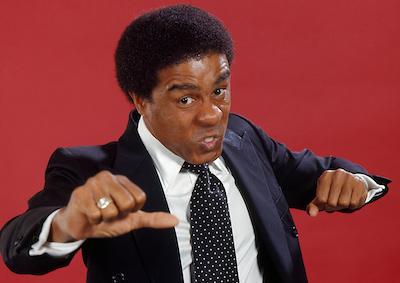Admission is free. No advance reservations. Seats are assigned on a first come, first served basis. Hammer Museum members will have reserved seating available at the box office. The box office opens one hour before the event.
The Richard Pryor Special?
U.S., 5/5/1977
For Richard Pryor, television in the 1970s had the potential to be a public forum for critiquing economic and racial injustice in America. During this period, Pryor moved between live stand-up, comedy albums, television appearances and what would begin a star turn in major motion pictures, including dramas. His growing success included an Emmy win for writing (Lily, 1974) and multiple Grammy Awards for his albums. These achievements led to lucrative deals with major film studios, and in 1977 a contract with NBC for The Richard Pryor Special? and, soon after, the short-lived Richard Pryor Show.
However, the question mark in The Richard Pryor Special? suggests the tenuous line the performer walked between his status as a sought-after talent and his trepidation as an artist employed by an industry that profited off the degradation of Black Americans. Months after the special aired, Pryor and NBC fought over issues of content and censorship. “One week of truth on TV could just straighten out everything,” he told Ebony magazine in 1978. “The problem with the censors is that they don’t like for people to communicate. I think it is on purpose and very political.”
In the 1960s, as a young comedian, Pryor’s humor was always concerned with race and racism and his experience as a Black man in America. However, it was during the 1970s that his comedy sharpened its critique of white supremacy throughout American society and political life. The Richard Pryor Special?, in collaboration with a distinguished cast of notable and up-and-coming talent (including Maya Angelou), is a celebration of Black culture that works through stereotypes with humanity and affection. On display is Pryor’s radical resistance that brings depth and contemplation to comedy with dramatic pause and joyous uplift — miraculously, within the confines of a prime-time slot.—Maya Montañez Smukler
DCP, color, 50 min. NBC. Executive Producer: Burt Sugarman. Producer: Bob Ellison. Director: John Moffitt. Writers: Rocco Urbisci, Alan Thicke, Paul Mooney, Bob Ellison, Richard Pryor, Maya Angelou. With: Maya Angelou, John Belushi, LaWanda Page, Richard Pryor, Glynn Turman.
Preservation funded by the John H. Mitchell Television Preservation Endowment. Preserved by the UCLA Film & Television Archive from an original 2 in. videotape. Video transfer at DC Video. Engineering services by David Crosthwait. Special thanks to John Ptak. Use courtesy of Burt Sugarman.






 Mobile Navigation
Mobile Navigation

